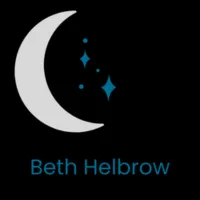"I would highly recommend Beth to anyone losing their way for whatever reason. She is inspiring and knows how to help and guide a lost soul in a soothing and kind way. She is a true light in my darkness." ~Andrea
The ramblings of a Star Priestess and Spiritual Life Purpose Coach and Mentor

Welcome to my blog. I love to write so I hope that you will enjoy my musings and ramblings that I will get to share with you in this space. I will share my thoughts with you on coaching, empowerment, my Priestess journey and my astrology journey and how it all comes together so beautifully.

The Power of Daily Journaling: A Path to Self-Discovery and Growth
“I never wrote things down to remember; I always wrote things down so I could forget-Matthew McConaughey”
Introduction:
In the general busyness of our daily lives, it's easy to overlook the importance of sacred self-care, self-reflection, and introspection. We often find ourselves swept away by the demands of work, relationships, and various responsibilities, leaving little time for contemplation. However, amidst the chaos, there exists a simple yet profound tool that has the potential to transform your life. What am I referring to? The journal.

1. Benefits of journaling
Journaling is more than just putting pen to paper; when you sit down to write, you are mindfully creating time for you, part of your sacred self-care practice. You are also investing in your personal growth and becoming much more self-aware.
Need convincing? Here are some of the benefits of having a regular journaling practice.
1.1 Clarity and Perspective: Journaling helps you to clarify your thoughts and emotions by putting them into words. It can help you to untangle complex feelings and gain perspective on various situations.
1.2 Emotional Expression: Writing in a journal provides a safe space for emotional expression. It allows you to process and release emotions, reducing stress and promoting emotional wellbeing.
1.3 Self-Reflection and Awareness: Regular journaling encourages self-reflection, helping you to become more self-aware. This can lead to insights about yourself, uncovering patterns of behaviour, and personal values.
1.4 Problem Solving: Journaling can serve as a tool for problem-solving. By writing about your challenges or conflicts, you can brainstorm solutions, weigh out pros and cons, and develop action plans.
1.5 Stress Reduction: Journaling can help reduce stress. Writing down your worries, fears, or anxieties on paper can help to alleviate their intensity and provide a sense of relief.
1.6 Creativity: Journaling can help to get those creative juices flowing, sparking new ideas and innovation.
1.7 Intention/Goal Setting and Accountability: Journaling is an effective way to set and track your intentions or goals. By writing down your intentions along with your progress, you are more likely to increase your motivation and commitment, which can lead to a greater chance of success.
1.8 Memory Preservation: Keeping a journal preserves memories and experiences for future reflection. It serves as a personal archive of your life journey, allowing you to revisit your past events and see how far you have grown and developed over time.
1.9 Improved Communication Skills: Regular writing in a journal can help you articulate your thoughts and feelings more clearly, which can help you with your communication skills in both your personal and professional relationships.
1.10 Enhanced Mental Health: There is evidence to show that journaling can have a positive effect on your mental health, including reducing symptoms of depression, anxiety, and PTSD.
2. So what is the difference between journaling and keeping a diary?
2.1 Purpose and Content: Journaling is more focused on things such as reflections, observations, creative writing, goal setting, gratitude lists, and consciousness writing. Writing in a journal can help you work on your personal growth, self-expression and exploring your thoughts and emotions. Keeping a diary is more about recording daily events, experiences, feelings and thoughts in a chronological order.
2.2 Formats: Journals can be created in various formats, handwritten books, digital, bullet journals, lists, mind maps, sketchbooks, even video or audio recordings. Diaries tend to be more traditional written in a notebook, dated.
2.3 Emphasis: Journaling is more about personal growth, introspection, and creativity. It's a tool for self-discovery, problem-solving, and emotional processing. Keeping a Diary records daily experiences and memories. You may still reflect on your day, your emotions etc. but the main emphasis will still be documenting the events of the day rather than actually exploring your emotions or insights.
3. Creating a journaling practice
Now you have a better understanding on what journaling is and the benefits, let me show you how easy it can be to begin a simple journaling practice.
3.1 Set Aside Time: Find a quiet, uninterrupted time each day to dedicate to journaling. It could be in the morning as a way to set intentions for the day ahead or in the evening as a reflection on the day's events. Consistency is key to forming a habit, so choose a time that works best for you.
3.2 Choose Your Medium: Decide whether you prefer to journal using a traditional pen and notebook or through digital platforms such as a laptop, iPad or dedicated journaling app. Choose whatever feels most comfortable and convenient for you. I am a traditional girl and love to buy beautiful journals and I also use a pencil rather than a pen. I feel more connected using a pencil and I find that I just flow more easily but that is a personal preference.
3.3 Start Small: You don't need to write lengthy essays; the important thing is to get into the habit of regular reflection. As you become more comfortable with journaling, you can gradually increase the length and depth of your entries.
3.4 Write Freely: There are no rules or restrictions when it comes to journaling. Write whatever comes to mind, whether it's your thoughts, feelings, experiences, or aspirations. Don't worry about grammar, spelling, or punctuation; this is for your eyes only.
3.5 Review and Reflect: Periodically review your past entries to track your progress, identify recurring themes, and celebrate your achievements. Use your journal as a tool for self-discovery and growth, allowing it to guide you on your journey towards a more fulfilling life.
3.6 Use Prompts: If you are unsure what to write then use prompts. These are great ways to start you off. You can also use Oracle or Tarot cards. There are many ways to help you start if you are unsure what to write to begin with. You should never feel pressured. Just go with the flow and see where your writing takes you.
4. Which journal is right for you
There are a variety of journaling that you may want to consider, depending on your interests and needs. Here are just a few:
4.1 Daily Reflection Journaling: This type involves writing about your thoughts, feelings, and experiences at the end of each day. It is a simple way to track your daily life, reflecting on events, and gain insights into your emotions and behaviours.
4.2 Gratitude Journaling: Gratitude journaling involves writing down things you are grateful for each day. It helps to cultivate a positive mindset, increase happiness, and foster appreciation for the blessings in your life.
4.3 Intention setting Journaling: Use this type of journaling to set, track, and review your goals. Write down your short-term and long-term goals, action plans, progress updates, and reflections on your journey towards achieving them.
4.4 Creative Journaling: Creative journaling allows you to express yourself through art, doodles, collages, and creative writing. It is a fun and therapeutic way to explore your creativity, experiment with different mediums, and let your imagination run wild.
4.5 Dream Journaling: Keep a journal by your bedside to record your dreams as soon as you wake up. Documenting your dreams can provide insights into your subconscious mind, recurring patterns, and hidden desires.
4.6 Travel Journaling: Capture your travel experiences, adventures, and memories in a dedicated travel journal. Write about the places you visit, people you meet, and moments that leave a lasting impression. Include photos, tickets, and mementos to create a keepsake of your journeys.
4.7 Mindfulness Journaling: Mindfulness journaling involves practicing mindfulness techniques such as deep breathing, meditation, and body scans, and then writing about your experiences, observations, and insights. It helps cultivate present-moment awareness, reduce stress, and enhance overall well-being.
4.8 Self-Discovery Journaling: Use this type of journaling to explore your values, beliefs, strengths, weaknesses, and life purpose. Ask thought-provoking questions, journal prompts, and self-assessment exercises to deepen your understanding of yourself and your inner world.
4.9 Fitness and Wellness Journaling: Keep a journal to track your physical activity, nutrition, sleep patterns, and overall well-being. Record your workouts, meal plans, health goals, progress measurements, and reflections on how lifestyle choices impact your health and fitness journey.
4.10 Reading Journaling: Document your reading experiences by keeping a journal dedicated to books you've read, favourite quotes, reflections on the content, and ideas sparked by the literature. This type of journaling can enhance comprehension, retention, and engagement with the material.
These are just a few examples of the many types of journaling you can explore. Feel free to experiment with different styles, formats, and techniques to find what resonates most with you and meets your specific needs and interests.
5. Conclusion
In conclusion, daily journaling is a powerful practice that offers numerous benefits for your mental, emotional, and spiritual well-being. By dedicating just a few minutes each day to reflect, express, and explore your inner world, you embark on a journey of self-discovery, growth, and transformation. So why not pick up a pen, (or pencil) and start journaling today? Your future self will thank you for it.
Why not join me on Wednesday 24 April for an evening of Breathwork, Meditation and Journaling as we take a deep dive to meet the Goddess Scorpio on the night of her Full Moon. It will be a great opportunity to do some journaling with prompts. This is an online event, and everyone is welcome. Investment is just £12. Full details can be found on my website here
With love and blessings
Beth

